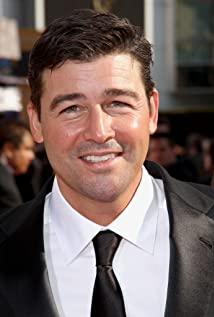"You don't understand, there's nothing left in my heart." The "calm" of the person crushed by grief runs through the whole film from beginning to end, even if it is reconciled by melodious classical music later, the atmosphere created by the whole film It was still as icy as the winter in Manchester town. And what constitutes this icy environment are cold-toned buildings and indifferent characters. The opening chapter succinctly shows the boring and monotonous work of the male protagonist Lee with a few sets of shots: going to other people's houses to clean sewers and repair toilets. These sets of shots are calm and restrained, and what they show is not the disgusting filth in the sewers, but Lee's gloomy and stern face. Lee treats everything in his life with a ruthless indifference. Whether the resident gave him a wink or a cold look, he didn't care at all. Even the sudden disaster failed to shatter the solemn atmosphere. When Lee learned the sad news of his brother's sudden death, he just dealt with the funeral step by step. As indifferent as Lee, and his sixteen-year-old nephew Patrick. The news of his father's death doesn't seem to have had much of an impact on his life. He still plays in the band and takes turns dating two girlfriends. Nothing seemed to stir the waves in the both of them. In fact, they are actually a kind of people in essence - their indifference is only due to grief, and after being overwhelmed by sudden grief, they have never recovered. But the difference is that Patrick has just been baptized by the flood of sadness. When he still loses control of his emotions, the emotions suppressed in his heart will suddenly burst out when he sees boxes of frozen chickens in the refrigerator. However, Lee has been sinking in this tide for many years, and his emotions have long since left him, and he has no emotions to lose control at all. His emotions were exhausted as early as in the scuffle with the police officers when he attempted to kill himself by grabbing a gun at the police station. The cold truth is that when Lee goes from house to house with water pipes, most of the time the camera is just silently peeping outside the room, trapping Lee in the door frame as the foreground. Although Lee's face is expressionless at this time, this framed composition indirectly accounts for his inner struggle: he tries to fight hard, only to find that he can't break free from the constraints that plague him. And the source of this bondage is revealed in a flashback halfway through the film: his three children were burned alive by the fire, and it was Lee himself who caused the tragedy. As chilling as the cause is, the most hopeless aspect of the film is the bondage itself. It makes Lee reluctant to let go of the past, but unable to see the future, to survive in the present, but unable to get out of the sadness and unable to establish an effective emotional communication with life. It can be said that it really shows how the individual is defeated in the struggle against tragedy. At the end of the film, Lee does not return to Manchester, and Patrick does not leave Manchester, and the two seem to be stuck in the same place after struggling for a while. Perhaps because we have been poured into too much chicken soup from childhood to adulthood, we are so convinced of the myth that mortals will eventually overcome tragedy: when two injured individuals meet, they will redeem each other, and finally overcome their inner grief together. Take this to obtain spiritual sublimation and start a new life from now on. We're so used to this kind of storyline that we're caught off guard when this unorthodox ending finally arrives. But when the screen goes dark, we realize, even if we don't want to admit it, that this grim ending is what life is all about. Not everyone can walk out of the shadow of tragedy, and maybe some people will sink into grief for the rest of their lives. Because the sadness brought by the tragedy is like a wave, when it is invaded by this wave, the colorful emotions in people's hearts are washed away, leaving only a cold color. The passage of time will not make the washed out colors reappear, because some things in the heart will not come back if they are lost. The so-called "time is the best antidote" is only our wishful thinking after all. In most people's lives, sadness is mostly unsolved. Chicken soup, we firmly believe in the myth that mortals will eventually overcome tragedy: when two injured individuals meet, they will redeem each other, and finally overcome their inner grief together, and thus obtain spiritual sublimation, and start a new period from now on. Life. We're so used to this kind of storyline that we're caught off guard when this unorthodox ending finally arrives. But when the screen goes dark, we realize, even if we don't want to admit it, that this grim ending is what life is all about. Not everyone can walk out of the shadow of tragedy, and maybe some people will sink into grief for the rest of their lives. Because the sadness brought by the tragedy is like a wave, when it is invaded by this wave, the colorful emotions in people's hearts are washed away, leaving only a cold color. The passage of time will not make the washed out colors reappear, because some things in the heart will not come back if they are lost. The so-called "time is the best antidote" is only our wishful thinking after all. In most people's lives, sadness is mostly unsolved. Chicken soup, we firmly believe in the myth that mortals will eventually overcome tragedy: when two injured individuals meet, they will redeem each other, and finally overcome their inner grief together, and thus obtain spiritual sublimation, and start a new period from now on. Life. We're so used to this kind of storyline that we're caught off guard when this unorthodox ending finally arrives. But when the screen goes dark, we realize, even if we don't want to admit it, that this grim ending is what life is all about. Not everyone can walk out of the shadow of tragedy, and maybe some people will sink into grief for the rest of their lives. Because the sadness brought by the tragedy is like a wave, when it is invaded by this wave, the colorful emotions in people's hearts are washed away, leaving only a cold color. The passage of time will not make the washed out colors reappear, because some things in the heart will not come back if they are lost. The so-called "time is the best antidote" is only our wishful thinking after all. In most people's lives, sadness is mostly unsolved.
View more about Manchester by the Sea reviews











